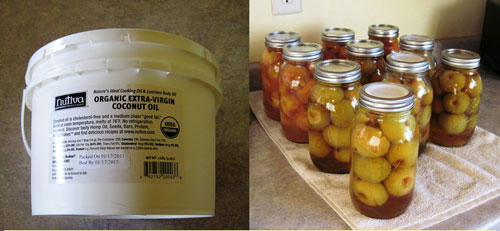When it comes to shelf life, processed foods actually do have their place in a disaster kit. They are cheap, flavorful and readily available. However, some may question their nutritional value.
For those of us who would like other options read the following:
* Live Culture Dairy
If you keep a yogurt culture that works at room temperature (such as viili from Cultures for Health, which I use), you can use it to culture powdered milk without a yogurt maker. While powdered milk is not ideal, it does store without refrigeration. Culturing makes the nutrients much more digestible. Milk kefir is also an option for a drinkable product. Milk kefir grains can also be used to culture coconut milk, if they are are occasionally revitalized in milk. Kefir provides protein, minerals and B vitamins. Traditional hard cheeses (such as Parmesan) may also last for months in cool dry temps.* Whole Grains
Whole grains (in general) have excellent shelf lives, much longer than milled flours. Places like Emergency Essentials sell grains and grain mills (electric powered and hand powered). If you keep a sourdough culture, you can use it to make many baked goods, not just bread, such as sourdough crackers. Again, using sourdough culturing makes the nutrients in the grain more available. Grains can also be sprouted and used to make a simple essene bread, which is very filling and nutritious. Read about the bulk grain order I organized here.* Chia seeds
Chia seeds have a shelf life of 4 to 5 years for dried seeds. They have omega-3 and omega-6 essential fatty acids, fiber, B vitamins, calcium and protein. They can be used to make drinks and no-cook puddings, as well as adding nutrition to baked goods and smoothies.* Sprouting seeds
Sprouting seeds also have a great storage life, generally 2 years or more. They are generally high in vitamin C, and may also contain other antioxidants and essential nutrients. They also provide fresh, growing food in a hurry when it may be in short supply. Sprouting seeds are easy to use. You can grow them in handy sprouting kits, or in sprouting bags or even nylon stockings. Mary Bell (in the Dehydrator Cookbook) suggests bringing sprouting seeds with you while camping. She says to soak them overnight in a bag of water, and then place them in a section of nylon sock attached to your backpack. Rinse daily, and in a few days you’ll have live, crunchy additions to your trail rations.* High Quality Saturated Fat
Coconut oil, lard and tallow will all keep for at least 12-18 months (most likely longer) in sealed, airtight containers kept in a cool area. Your body needs healthy fats. Your brain is largely made up of fat, as is protective coating on your lungs, and many other critical body systems. Fats are energy dense, which is also critical during emergency situations.
My personal favorite coconut oil is Nutiva, which tastes like fresh coconut to me.* Dried Legumes
Dried beans have a great shelf. They will keep around a year in just the plastic bags from the store, 10 to even 30 years if sealed in airtight containers with oxygen removed. Utah State University Cooperative Extension states: “Dry beans average about 22% protein in the seed, the highest protein content of any seed crop. They contain all essential amino acids, except methionine. Methionine can be obtained from corn, rice, or meat. Beans are an excellent source of fiber, starch, minerals and some vitamins. ”* Real Salt
Unrefined salt has many trace minerals that are essential to health. In my experience, the unrefined salts (Real Salt, grey sea salt, pink salt, etc.) have a “saltier” more robust flavor, meaning you can use less to achieve the same result. Salt can also be used to preserve food (such as fermenting vegetables, above, and meats). Since ancient times, salt has been also used as a valuable trade commodity.
And besides the items above there are also other food-stuffs to consider like fermented vegetables, herbs and teas. There is definitely no reason to go hungry when the unexpected or even typical bad weather strikes. All it takes is a little planning and common sense.
For more information about spices, sweeteners and other food stuffs that can be stored for long periods of time please go to Common Sense Homesteading.
